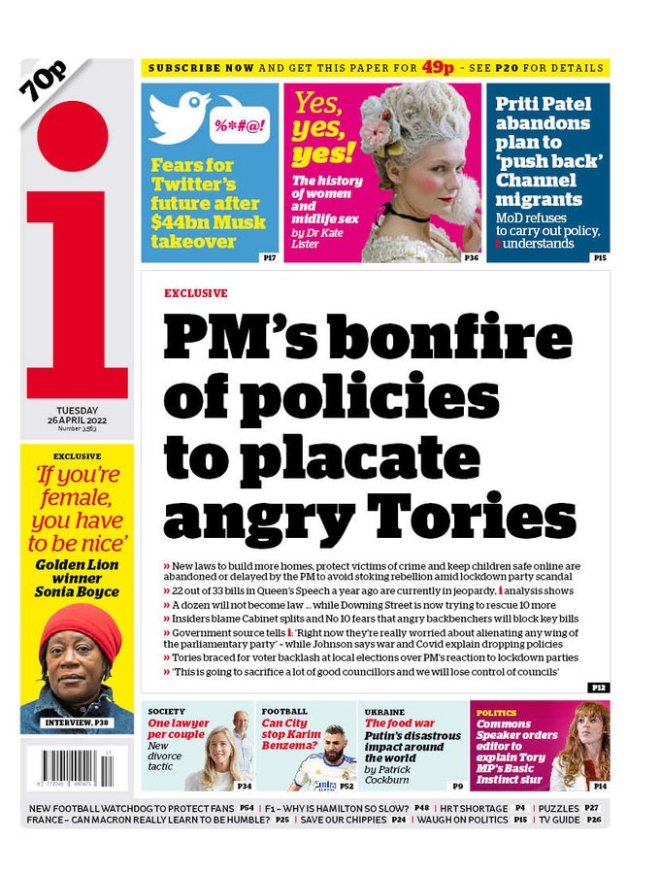20 June 2022
The pulling by the Times of the ‘Chief of Staff’ story about Boris and Carrie Johnson is interesting in many ways – and this post explains why it is interesting from a media lawyer’s perspective.
As a preliminary point, however, I must mention I have no private information about any of this – this post is based entirely on information in the public domain.
And this post is not about the details about the story, of which I have no knowledge – it is instead an account of how decisions are made and not made to publish and pull such stories.
(By way of background – part of my own legal practice is media defence, protecting journalists and publications from legal threats.)
*
From a media lawyer’s perspective, there are two key decisions here.
The first was the decision to publish.
For a well-resourced, well-lawyered news title like the Times, things are not published casually in their print editions.
There is an internal editorial and often legal process that is followed.
The published article is often like stage five of a process, and not stage one.
And this is especially the case when the reporter in question is experienced and competent.
There will be a lot of source-checking and verification by the reporter themselves.
Sometimes corners are cut and mistakes made – and ‘online’ stories often do not have the same care.
But stories in print editions of well-resourced, well-lawyered news titles like the Times are not published by accident.
This means that it was believed that the story “stood up” before it was published – and that the serious allegation made in the story was sufficiently grounded so as to minimise or eliminate legal risk.
It also means (usually) that the targets of the serious allegation have had an opportunity to have the allegations put to them before publication – or at least should have done.
And this pre-publication stage would have been the time for any legal threats aimed at preventing publication.
*
The second is the decision to pull the story.
Here I will put forward the perhaps unpopular view that there is nothing wrong with a story being pulled from later print editions (and from the internet) if it becomes obvious that the story no longer stands up.
Indeed, it is a pity that does not happen more often – but most editors are reluctant to pull something once published.
But if new information comes to light so it is plain that the story published is not correct, or if it becomes apparent that legal wrong has been committed in how the story was put together, then pulling the story can be an appropriate and responsible thing to do.
It is, however, exceptional.
The new information must be substantial, or the crystallised legal risk must be overwhelming.
As to pull a story is a serious thing to do.
Especially when that story stood up after the editing and (what is called) ‘lawyering‘ process.
And for a story to be pulled rapidly implies that the process before publication had failed.
*
So when this story was pulled, I assumed that something had come to light that meant that the story no longer stood up.
This was unlikely, in the circumstances, given the seniority and reputation of the journalist involved.
But other possibilities seemed even more unlikely.
Some on Twitter speculated wildly and breathlessly about ‘super-injunctions’ and ‘D-Noticies’ – but neither made sense in these circumstances, not least because that would not explain the decision to publish, as both such an injunction or a D-Notice would usually have been served once those against whom the allegations were being made were approached for prior comment.
And the subject matter of the story also did not lend itself to ‘super-injunctions’ and ‘D-Noticies’– it was about public money (not an entirely private matter) and there was no obvious, serious issue of national security.
(‘Super-injunctions’ are also now almost impossible to obtain.)
So, ruling out a ‘super-injunction’ and a ‘D-Noticie’ left only the mundane explanation that the story no longer stood up – notwithstanding the pre-publication process and the standing of the journalist.
This sort of thing happens – and there is nothing wrong with pulling a story that no longer stands up.
But.
The journalist then stated that he did stand by the story – meaning that, as far as he was concerned, the story still stood up.
And many of the details of the story had already been published in a book – and this made it difficult to see how the story was legally problematic.
So there was not a journalistic reason for pulling the story.
And there was not a legal reason for pulling the story.
This meant that the story may have been pulled for another reason – a non-journalistic, non-legal explanation.
How curious.
Downing Street did speak to the Times in between them publishing the story about Boris Johnson and Carrie and the paper taking it down, his spokesman suggests.
— Adam Bienkov (@AdamBienkov) June 20, 2022
***
Comments Policy
This blog enjoys a high standard of comments, many of which are better and more interesting than the posts.
Comments are welcome, but they are pre-moderated and comments will not be published if irksome.








